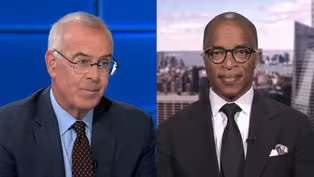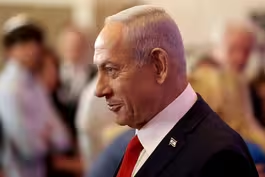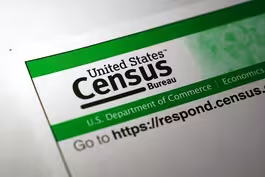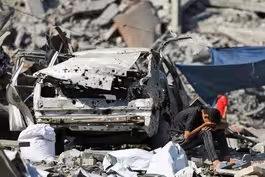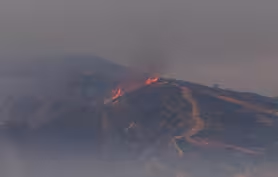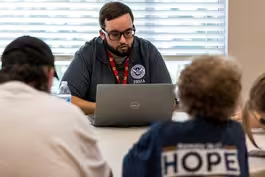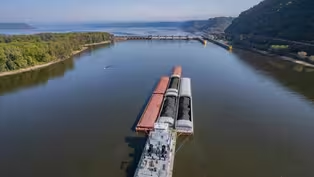
Trump to meet with Putin for talks on ending Ukraine war
Clip: 8/8/2025 | 6m 38sVideo has Closed Captions
Trump will meet with Putin in Alaska for talks on ending Russia's war in Ukraine
President Trump said he will meet with Russian President Vladimir Putin next Friday in Alaska. Friday was Trump's initial deadline for Russia to agree to a peace deal with Ukraine or face new sanctions, including tariffs on nations that buy Russian oil. But it's still unclear how or whether Trump intends to follow through on his threat. Geoff Bennett discussed more with Thomas Graham.
Problems playing video? | Closed Captioning Feedback
Problems playing video? | Closed Captioning Feedback
Major corporate funding for the PBS News Hour is provided by BDO, BNSF, Consumer Cellular, American Cruise Lines, and Raymond James. Funding for the PBS NewsHour Weekend is provided by...

Trump to meet with Putin for talks on ending Ukraine war
Clip: 8/8/2025 | 6m 38sVideo has Closed Captions
President Trump said he will meet with Russian President Vladimir Putin next Friday in Alaska. Friday was Trump's initial deadline for Russia to agree to a peace deal with Ukraine or face new sanctions, including tariffs on nations that buy Russian oil. But it's still unclear how or whether Trump intends to follow through on his threat. Geoff Bennett discussed more with Thomas Graham.
Problems playing video? | Closed Captioning Feedback
How to Watch PBS News Hour
PBS News Hour is available to stream on pbs.org and the free PBS App, available on iPhone, Apple TV, Android TV, Android smartphones, Amazon Fire TV, Amazon Fire Tablet, Roku, Samsung Smart TV, and Vizio.
Providing Support for PBS.org
Learn Moreabout PBS online sponsorshipGEOFF BENNETT: President Trump said today that he will meet with Russian President Vladimir Putin next Friday in Alaska.
Speaking at the White House this afternoon, the president also said he's talking to Russia and Ukraine about swapping territory as part of a settlement to end the war.
DONALD TRUMP, President of the United States: You're looking at territory that's been fought over for 3.5 years.
We're actually looking to get some back and some swapping.
It's complicated.
It's actually nothing easy.
It's very complicated, but we're going to get some back.
We're going to get some switched.
There will be some swapping of territories, to the betterment of both.
GEOFF BENNETT: Today was Mr. Trump's initial deadline for Russia to agree to a peace deal or face new U.S. sanctions, including secondary tariffs on China and other nations that buy Russian oil.
But as of this evening, it's still unclear how or whether President Trump intends to follow through on his threat.
For more on all this, we turn to Thomas Graham.
He served on the National Security Council staff during the George W. Bush administration and at the State and Defense Departments.
He's now a distinguished fellow at the Council on Foreign Relations.
Mr. Graham, thank you for being with us.
THOMAS GRAHAM, Council on Foreign Relations: Good to be with you.
GEOFF BENNETT: So let's start with this meeting.
When this happens next Friday in Alaska, President Trump and President Putin, under what circumstances could it be constructive?
THOMAS GRAHAM: Well, it can be constructive if the two presidents, I think, agree on a way forward towards an enduring cease-fire in Ukraine and chart a pathway towards an enduring settlement.
Those, I think, are what is possible at this point.
It'll take a lot of, I think, very careful planning in the coming week, but that is something that we could hope for next Friday.
GEOFF BENNETT: And how far apart right now are Washington and Moscow on the core principles for a settlement?
THOMAS GRAHAM: I think they are extremely far apart.
There may be some compromise on the territorial issue.
The president has talked about that, but, obviously, Ukraine has a say in that.
There are questions about NATO, NATO security, security guarantees for Ukraine.
We have different views on those matters.
But I think the toughest issue is really one that concerns the status of that part of Ukraine that's not controlled by Russia at the end of this conflict.
Kremlin, President Putin, clearly wants a Ukraine that is subordinate to Russia, that has a relationship that is akin to the one that Belarus has with Russia today.
The United States should be and I believe is indeed interested in the preservation of a sovereign and independent Ukraine, a Ukraine that can decide its own foreign policy and decide how to orient itself geopolitically.
GEOFF BENNETT: President Trump was not specific when he said that there will be a swapping of territories, but Russian President Vladimir Putin has reportedly offered the Trump administration a cease-fire in Ukraine, but only in exchange for major territorial concessions, including handing over Eastern Ukraine's Donbass region.
You see the map there on the screen.
What would accepting that mean for Ukraine's sovereignty?
THOMAS GRAHAM: Well, if it were recognized de jure, that would be a tremendous blow to Ukraine's sovereignty.
Ukraine still wants to regain its borders of 1991.
I think the belief that Kyiv at this point is that you can't do that through military means, but there's a hope that over time you could achieve that through diplomatic means.
So this would be a significant blow to Ukraine's sovereignty and something that I am absolutely certain Kyiv would not agree to.
GEOFF BENNETT: President Zelenskyy is not expected to attend this meeting next week.
There could potentially be others, but how big of a problem is that and how should the U.S. manage Ukrainian and European concerns about being sidelined?
THOMAS GRAHAM: Well, the first thing to note, that this is not simply about the Ukraine conflict or the Russia-Ukraine war.
There are broader issues in U.S.-Russian relations, European security, strategic stability, the conversations about the Middle East and the Arctic that we need to have.
So not all of this is about Ukraine.
And I think, for that reason, it is reasonable that Ukraine not be present at the upcoming meeting.
That said, the administration really does need to make a concerted effort to keep the Ukrainians informed of their discussions with Russia, to make sure that they understand what the United States is going to say to President Putin, and that the administration conveys back clearly what they are told by the Russians.
The Ukrainians have to be part of the deal at the end of the day.
It is their territory.
It is their country.
The conflict is being fought on their territory.
So this is not a situation where the United States and Russia can come together, reach an agreement, and impose it on the Ukrainians.
Ukrainians will resist, and many, if not most of our European allies will also resist.
GEOFF BENNETT: Given the battlefield realities, what would a least bad settlement look like from Kyiv's perspective right now?
THOMAS GRAHAM: Well, I think freezing the battle lines where they are at this point, with no de jure recognition of Russia's occupation of Ukrainian territory.
I do believe that a final settlement will preclude Ukraine's membership in NATO, but in exchange Ukraine needs to get solid security guarantees from the United States, European allies, a promise to continue the type of financial and military support that Ukraine needs to sustain itself as an independent country.
That, I think, would be a -- the best outcome the Ukrainians could hope for at this point.
Retaining their sovereignty through independence, retaining the possibility of joining the E.U.
is actually a good position for Ukraine to be in and can lead to a very sort of prosperous and secure future for Ukraine.
GEOFF BENNETT: Thomas Graham, great to speak with you.
Thank you so much for your insights.
We appreciate it.
THOMAS GRAHAM: You're certainly welcome.
Brooks and Capehart on Israel's plans to control Gaza
Video has Closed Captions
Clip: 8/8/2025 | 10m 3s | Brooks and Capehart on Israel's plans to exert more control over Gaza (10m 3s)
Gaza takeover won't end Hamas influence, Mideast expert says
Video has Closed Captions
Clip: 8/8/2025 | 5m 41s | Netanyahu's Gaza takeover won't end Hamas influence in the region, Mideast analyst says (5m 41s)
How Trump's census plan could reshape congressional maps
Video has Closed Captions
Clip: 8/8/2025 | 4m 48s | How Trump's census plan could reshape congressional maps (4m 48s)
Israel decides to take Gaza City, sparking condemnation
Video has Closed Captions
Clip: 8/8/2025 | 4m | Israel's government decides to take Gaza City, sparking condemnation and protests (4m)
News Wrap: Thousands flee fire in mountains near LA
Video has Closed Captions
Clip: 8/8/2025 | 5m 56s | News Wrap: Thousands forced to flee Canyon Fire in mountains near LA (5m 56s)
Recent natural disasters highlight Trump's changes to FEMA
Video has Closed Captions
Clip: 8/8/2025 | 6m 31s | Federal response to recent disasters reveals impact of Trump's changes to FEMA (6m 31s)
Scientists face ecological, economic hurdles to save delta
Video has Closed Captions
Clip: 8/8/2025 | 8m 24s | Scientists face ecological and economic hurdles to save Mississippi River Delta (8m 24s)
Providing Support for PBS.org
Learn Moreabout PBS online sponsorshipSupport for PBS provided by:
Major corporate funding for the PBS News Hour is provided by BDO, BNSF, Consumer Cellular, American Cruise Lines, and Raymond James. Funding for the PBS NewsHour Weekend is provided by...
